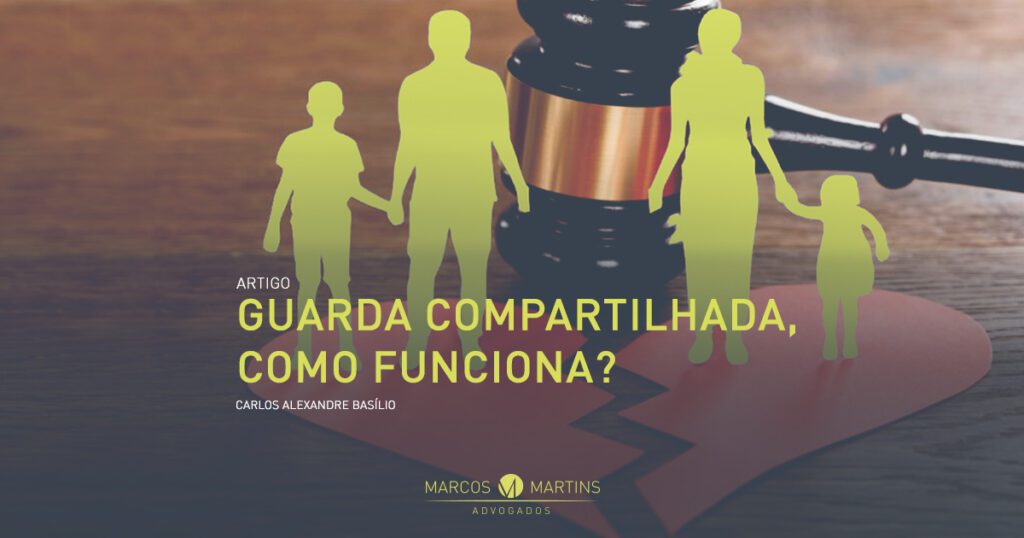Carlos Alexandre Basílio
Lawyer at Marcos Martins Advogados
Nowadays, it has become increasingly common for couples with minor children, whether they are still babies, children or teenagers, to divorce. And as a result of the breakdown of the marital bond, a question of paramount importance arises: “Who will have custody of the children?”. Regardless of the reasons for the breakdown of the marital relationship, both parents are responsible for the full exercise of family power which, as far as the children are concerned, is to direct their upbringing and education; to require them to render obedience, respect and the services appropriate to their age and condition[1], among other obligations.
Custody of children after the end of a marriage has been a topic frequently faced by courts specializing in family law, discussed by psychologists, social workers and scholars on the subject. Faced with the need to regulate the issue, legislators stipulated that “custody shall be unilateral or shared”, as provided for in art. 1583 of the Brazilian Civil Code of 2002. Later, in 2014, Federal Law No. 13,058 innovated and established that “In shared custody, the time spent with the children must be divided in a balanced way between the mother and the father, always taking into account the factual conditions and the interests of the children.”
The aforementioned law innovated by establishing shared custody as the rule, even and especially if there is no agreement between the parents regarding custody of the child, as long as both are able to exercise family power, unless one of the parents declares to the magistrate that they do not want custody of the child.[2] The law also establishes shared custody as the rule.
“The foundations of shared custody are of a constitutional and psychological nature, basically aimed at guaranteeing the interests of the offspring. It means more prerogatives for the parents, making them more present in their children’s lives”[3].
In other words,
- […] shared custody defines the two parents, from a legal point of view, as equal holders of parental authority to make all decisions affecting the children. Its purpose is to maintain the bonds of affection, seeking to soften the effects that the end of the marital partnership can have on the children, while at the same time trying to maintain the parental role in an equal manner, enshrining the rights of the child and the parents.[4]
There has been a consensus among legal scholars and operators that the participation of parents in the development process in an integral way entails a pluralization of responsibilities. Thus, the application of shared custody aims to maintain the bonds of affection established between parents and children, allowing the effects that a separation inevitably brings to be reduced. As a result, it also allows parents to exercise their parental role on an equal footing. Roughly speaking, it allows parents to equally share and participate in their children’s growth and development.
The application of shared custody is a reflection of the new organization of our society, which is increasingly moving towards the end of rigid divisions of social roles defined by gender. Although separation or divorce entails a physical separation of the couple, the well-being of the child must prevail, and shared custody is the remedy for mitigating the consequences of the parents’ separation from their children.
It is also important to bear in mind that the judicial imposition of the duties that will fall to each parent and the period of time that the child will live with each parent is an extreme measure, and the parents should seek – as far as possible – a consensus on the respective duties. This is because joint physical custody is the ideal to be sought when establishing custody, preventing one parent from being the main person responsible for raising the children and individually bearing the duties inherent in this upbringing. Furthermore, only when both parents expressly agree to unilateral custody will the judge not be able to impose shared custody.
However, it is also important to note that the legislation states that
- […] to establish the attributions of the father and mother and the periods of cohabitation under shared custody, the judge, ex officio or at the request of the Public Prosecutor’s Office, may base himself on technical-professional or interdisciplinary team guidance, which should aim at a balanced division of time with the father and mother[5].
When analyzing requests and defining the application of shared custody, the courts establish certain conditions that must be strictly observed, including (i) the peculiarities of the facts involving parents and children; (ii) the location of the homes; (iii) the financial capacity of the parties; (iii ) the availability of time; (iv) the minor’s routines. They also seek shared custody as a rule and joint physical custody as its effective expression.
It is also worth remembering that parents are also allowed – provided they agree – to establish free, unrestricted visits, which has proved extremely beneficial to the child, given that the child will remain in the company of both parents, without time restrictions, thus reducing the psychological effects of separation.
Experience has shown incontestably that when the marital bond is terminated – whether by divorce or separation – when parents seek the composition and application of shared custody, there will be the maximum reduction in harm to the child. This is because the child will be guaranteed equal coexistence with their parents, and will be surrounded by greater, peaceful and healthy family integration, also allowing both parents to actively participate in school and social activities, while also jointly sharing in the management of their children’s interests and needs. Finally, it cannot be said enough: separation is for the parents, not the children.
- [1] BRAZIL. Civil Code – Law 10406/02, of January 10, 2002. Establishes the Civil Code, Brasília, DF, Jan 2002.
- Art. 1.634. Both parents, regardless of their marital status, are responsible for the full exercise of family power, which consists of, with regard to the children: (Edited by Law no. 13.058, of 2014)
- I – directing their upbringing and education; (Edited by Law No. 13.058, of 2014)
- II – exercise unilateral or shared custody under the terms of art. 1.584; (Redaction given by Law no. 13.058, of 2014)
- III – to grant or deny them consent to marry; (Redaction given by Law No. 13.058, of 2014)
- IV – to grant or deny them consent to travel abroad; (Redaction given by Law No. 13.058, of 2014)
- V – grant or deny them consent to move their permanent residence to another Municipality; (Edited by Law No. 13.058, of 2014)
- IV – grant or deny them consent to travel abroad; (Edited by Law No. 13.058, of 2014)
- VI – appoint them guardian by will or authentic document, if the other parent does not survive them, or the surviving parent is unable to exercise family power; (Editing by Law No. 13.058, 2014)
- VII – to represent them judicially and extrajudicially up to the age of 16 (sixteen) in acts of civil life, and to assist them, after that age, in acts in which they are parties, suppressing their consent; (Edited by Law No. 13.058, of 2014)
- VIII – claim them from anyone who unlawfully detains them; (Included by Law No. 13.058, of 2014)
- IX – demand obedience, respect and services appropriate to their age and condition. (Included by Law No. 13.058, 2014)
- [2] BRAZIL. Civil Code – Law 10406/02, art. 1.584, §2º of January 10, 2002. Establishes the Civil Code, Brasília, DF, Jan 2002.
- § Paragraph 2 When there is no agreement between the mother and father regarding custody of the child, shared custody will be applied whenever possible. (Included by Law No. 11.698, of 2008).
- [3] DIAS, Maria Berenice. Manual de Direito das Famílias, 9th ed. rev. atual. e ampl. São Paulo, Editora Revista dos Tribunais, 2013, p. 454/455).
- [4] ROSA, Conrado Paulino da. Nova Lei da Guarda Compartilhada, 1st ed., Saraiva, p. 63.
- [5] BRAZIL. Civil Code – Law 10406/02, art. 1584 §3º of January 10, 2002. Establishes the Civil Code, Brasília, DF, Jan 2002.








